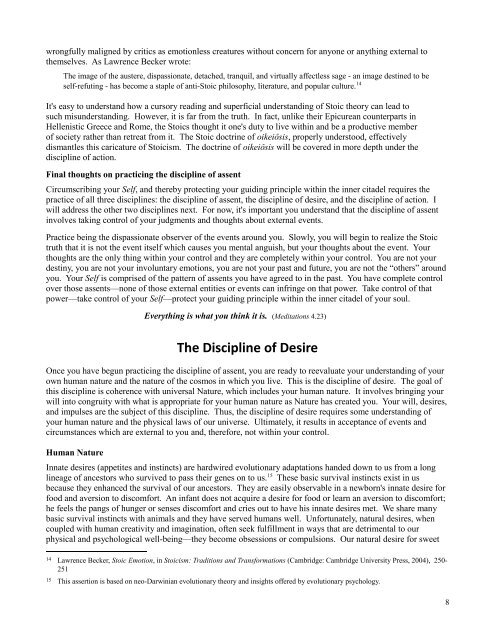Self-Coherence: - College of Stoic Philosophers
Self-Coherence: - College of Stoic Philosophers
Self-Coherence: - College of Stoic Philosophers
You also want an ePaper? Increase the reach of your titles
YUMPU automatically turns print PDFs into web optimized ePapers that Google loves.
wrongfully maligned by critics as emotionless creatures without concern for anyone or anything external tothemselves. As Lawrence Becker wrote:The image <strong>of</strong> the austere, dispassionate, detached, tranquil, and virtually affectless sage - an image destined to beself-refuting - has become a staple <strong>of</strong> anti-<strong>Stoic</strong> philosophy, literature, and popular culture. 14It's easy to understand how a cursory reading and superficial understanding <strong>of</strong> <strong>Stoic</strong> theory can lead tosuch misunderstanding. However, it is far from the truth. In fact, unlike their Epicurean counterparts inHellenistic Greece and Rome, the <strong>Stoic</strong>s thought it one's duty to live within and be a productive member<strong>of</strong> society rather than retreat from it. The <strong>Stoic</strong> doctrine <strong>of</strong> oikeiôsis, properly understood, effectivelydismantles this caricature <strong>of</strong> <strong>Stoic</strong>ism. The doctrine <strong>of</strong> oikeiôsis will be covered in more depth under thediscipline <strong>of</strong> action.Final thoughts on practicing the discipline <strong>of</strong> assentCircumscribing your <strong>Self</strong>, and thereby protecting your guiding principle within the inner citadel requires thepractice <strong>of</strong> all three disciplines: the discipline <strong>of</strong> assent, the discipline <strong>of</strong> desire, and the discipline <strong>of</strong> action. Iwill address the other two disciplines next. For now, it's important you understand that the discipline <strong>of</strong> assentinvolves taking control <strong>of</strong> your judgments and thoughts about external events.Practice being the dispassionate observer <strong>of</strong> the events around you. Slowly, you will begin to realize the <strong>Stoic</strong>truth that it is not the event itself which causes you mental anguish, but your thoughts about the event. Yourthoughts are the only thing within your control and they are completely within your control. You are not yourdestiny, you are not your involuntary emotions, you are not your past and future, you are not the “others” aroundyou. Your <strong>Self</strong> is comprised <strong>of</strong> the pattern <strong>of</strong> assents you have agreed to in the past. You have complete controlover those assents—none <strong>of</strong> those external entities or events can infringe on that power. Take control <strong>of</strong> thatpower—take control <strong>of</strong> your <strong>Self</strong>—protect your guiding principle within the inner citadel <strong>of</strong> your soul.Everything is what you think it is. (Meditations 4.23)The Discipline <strong>of</strong> DesireOnce you have begun practicing the discipline <strong>of</strong> assent, you are ready to reevaluate your understanding <strong>of</strong> yourown human nature and the nature <strong>of</strong> the cosmos in which you live. This is the discipline <strong>of</strong> desire. The goal <strong>of</strong>this discipline is coherence with universal Nature, which includes your human nature. It involves bringing yourwill into congruity with what is appropriate for your human nature as Nature has created you. Your will, desires,and impulses are the subject <strong>of</strong> this discipline. Thus, the discipline <strong>of</strong> desire requires some understanding <strong>of</strong>your human nature and the physical laws <strong>of</strong> our universe. Ultimately, it results in acceptance <strong>of</strong> events andcircumstances which are external to you and, therefore, not within your control.Human NatureInnate desires (appetites and instincts) are hardwired evolutionary adaptations handed down to us from a longlineage <strong>of</strong> ancestors who survived to pass their genes on to us. 15 These basic survival instincts exist in usbecause they enhanced the survival <strong>of</strong> our ancestors. They are easily observable in a newborn's innate desire forfood and aversion to discomfort. An infant does not acquire a desire for food or learn an aversion to discomfort;he feels the pangs <strong>of</strong> hunger or senses discomfort and cries out to have his innate desires met. We share manybasic survival instincts with animals and they have served humans well. Unfortunately, natural desires, whencoupled with human creativity and imagination, <strong>of</strong>ten seek fulfillment in ways that are detrimental to ourphysical and psychological well-being—they become obsessions or compulsions. Our natural desire for sweet14 Lawrence Becker, <strong>Stoic</strong> Emotion, in <strong>Stoic</strong>ism: Traditions and Transformations (Cambridge: Cambridge University Press, 2004), 250-25115 This assertion is based on neo-Darwinian evolutionary theory and insights <strong>of</strong>fered by evolutionary psychology.8
















